
by Valley Gadfly | Jan 19, 2024 | Valley Gadfly
Valley Gadfly
As February begins, there is everything to hope for — including love — and nothing to regret. “Without Valentine’s Day, February would be…. well, January,” someone supposed.
It was during 1967’s “Summer of Love” that the Beatles first released the song, “All You Need Is Love.” To this day — 57 years later — it’s a message that really can’t be denied.
Here are our shortest month of the year choices for shopping, dining, and entertainment as we say goodbye to winter and warm up to brighter, sunnier days with V-Day love in the air:
Enjoy a double-header of entertainment as Michael Kirkpatrick and Elise Wunder do sets at Swallow Hill’s Tuft Theater Feb. 2, 8 p.m. He sings a folk-fingerstyle blend, she adds rhapsody, emotion. Information: 303-623-7876.
Hear “Black Violin” duo Kevin Sylvester and Wilner Baptiste play violin-viola music at the Paramount Theatre Feb. 4, 7:30 p.m. Information: 303-623-0106.
Don’t miss a rare opportunity to hear Welsh pop-punk band Neck Deep playing in person at the Mission Ballroom Feb. 8, 7 p.m. Information: 720-577-6884.
Denver Brass combines creole jazz of New Orleans with hip-shaking rhythms of Brazil at the Newman Center, Feb. 10-11, 2:30 p.m. Information: 303-871-7715.
Don’t let rug specials — up to 60% off — slip away from you at Kian Rug Co. store demolition, closing sale. Choose from over 4,000 fine hand-knotted rugs on sale. Modern, contemporary, traditional, vintage, more. Information: 303-355-7400.
You’ll be “head over heels” for the Valentine Specials offered at the Monaco Inn Restaurant on V-Day, 5-9 p.m. Choices: NY Steak & Deep-Fried Shrimp; Lamb Chops with Grilled Shrimp; or Grilled Salmon. Information: 303-320-1104.
The Tierney Sutton instrumental-vocal band entertains with jazz pianist Tamir Henderlman at Dazzle Denver Feb. 17, 6:30 p.m. Information: 303-839-5100.
Cellist Nicholas Canellakis and pianist Michael Brown play classics and original works at the Lakewood Center Feb. 22, 7:30 p.m. Information: 303-987-7845.
See the 80s synth-pop band retelling of The Sleeping Beauty at Wonderbound, playing Feb. 22-March 3, 7:30 p.m., Sun. 2 p.m. Information: 303-292-4700.
The Colorado Symphony & Chorus perform Beethoven’s Ninth Symphony at Boettcher Hall Feb. 23-25, 7:30 p.m., Sun. 1 p.m. Information: 720-865-4200.
Attend the fun, funky, fabulous art auction and fundraising extravaganza Artma at the Denver Design Center Feb. 24, 6-10 p.m. The Morgan Adams Foundation that funds kids’ cancer research created the event for a little girl who believed in the healing power of art. View and bid on the colorful wonderment work by Australian Artist Janine Daddo and the pop culture oil-on-canvas paintings and watercolors of Colorado artist Zoa Ace, others. Information: 303-758-2130.
February is not just special because it’s love month. It’s also the only month with fewer than 30 days. Though it’s usually 28 days, 2024 is leap year, which means leap day is Feb. 29th.
Love, like the weather, is unpredictable: rainy, wet, dry, frigid, foggy, windy, stormy. As Shakespeare asked in Macbeth: “When shall we meet again? In thunder, lightning, or in rain?”
Wishing you a month filled with love and happiness. Remember, February is the month when love blooms and chocolate cravings take over, even when you get butterfingers.
— Glen Richardson
The Valley Gadfly can be reached at newspaper@glendalecherrycreek.com.
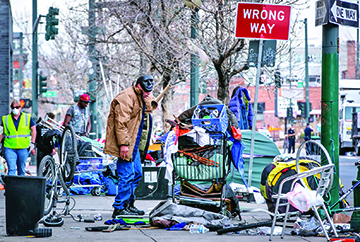
by Valley Gadfly | Dec 15, 2023 | Main Articles
New Audit Reveals Denver Is Delivering Fewer Units Than Required, Costs Climb For Taxpayer-Funded Affordable Housing
by Glen Richardson
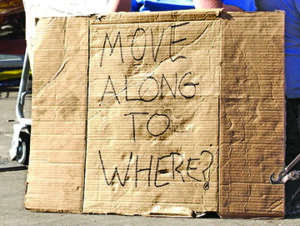
As 2024 begins, residents want to know if Mayor Mike Johnston met his $50 million promise to move 1,000 of Denver’s homeless off the streets by year’s end. Many others — like Councilmember Stacie Gilmore, who resigned as homeless committee chair — have concluded the administration’s homeless pledge is nothing more than “a dog and pony show.”
Facing the facts: Denver has the nation’s 10th-most homeless people. At year’s end there were 802 homeless people getting monthly payments of from $50 to $1,000. One group receives $1,000 a month for 12 months; another received a $6,500 lump payment and then $500 a month for 11 months; and the final group receives $50 a month for a year. For this year (2024), Mayor Johnston proposes to spend $242 million on homeless-affordable housing.
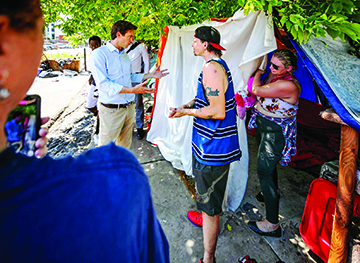
Street Sweep Scene: Denver continues to perform “sweeps” of homeless encampments under new Denver Mayor Mike Johnston. Photo: Kevin J. Beaty
A new financial examination by Denver Auditor Timothy M. O’Brien, however, reveals that finding housing or giving out money — without managing inherent and built-in factors — may b

Street Squalor Struggle: Despite providing money, plus developing and prioritizing affordable housing projects, Denver’s homeless crisis continues to surge as 2024 begins. Photo (left): Hart Van Denburg/CPR
e an emotional feat, but won’t accomplish the city’s objectives.
Unit Count Con
The audit’s most glaring discovery: Denver’s Department of Housing Stability is not delivering the required number of units. Fact: Denver developed 32 fewer units for very-low income and 301 fewer for moderate-income households than required by the city agreement.
Equally disturbing: The agency reported 203 units for rent at “market rates,” claiming they count as part of the agreement to develop affordable housing.
Lack of oversight is to blame, according to Auditor O’Brien. “If affordable housing is a priority, leaders need to effectively use resources, show accountability for housing goals, and commitment to helping those in Denver who need it m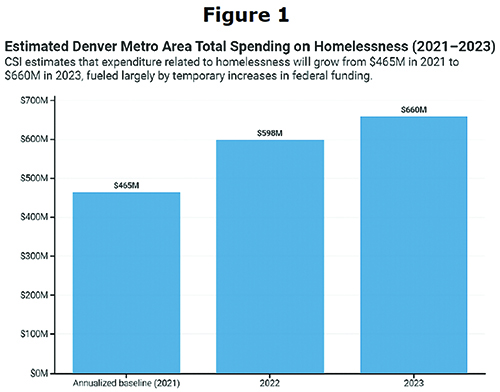 ost,” he asserts.
ost,” he asserts.
Shoddy Upkeep
Auditors also found a lack of oversight to maintain safe-habitable housing units for people in the lowest income ranges. Not only are these people subject to health-safety risks, but the city could lose part of its affordable housing inventory due to damage and disrepair.
A random check of 20 affordable housing projects funded by the Department of Housing Stability — plus an affordable housing project used as permanent housing and funded with program funds — examiners found building doors unlocked or propped open; doors missing handles; water damage; pet or human waste in public areas; plus, trash and debris.
More: Broken windows; dirty or damaged carpets; potential fire code violations, which were reported to the fire department; large cracks and other damage to exterior brick or foundations; evidence of pest infestations; exposed electrical wires or damaged electrical features; window and screens missing or damaged; inoperable or malfunctioning elevators; standing water in public areas; and damaged interior and exterior lighting.
Fewer New Units
Even more troubling, auditors found plans for new units are falling below requirements in the city’s taxpayer-funded agreement with the Denver Housing Authority. Denver partners with the Denver Housing Authority on their “DHA Delivers for Denver Program” — commonly called “D3.”

Broadway’s Best: Purchased by the Denver Housing Authority and completed in 2022, this 655 Broadway Bldg. rents to income limited elderly and disabled.
The audit discovered the housing authority reported some units were being rented at market rate, instead of at affordable rates for people with low-income levels.
Moreover, the housing authority also developed fewer units for low-and moderate-income individuals than required. Bottom line: Investments may and many times exceed what was agreed upon. There is no clarity on how many housing units will be delivered or if the units will be affordable for people who need it most. “The city needs stronger oversight to confirm the affordable housing results it promises,” says Auditor O’Brien. “It’s clear the city is too trusting in third-party partners and as a result the people who need the most help could be left out.”
Half Have High Rent
Just as shocking and upsetting, the audit reveals that half of the units in the city’s D3 agreement exceed the rents allowed by that agreement.
The housing authority reported 203 market-rate units paid for by the city’s D3 agreement were rented for between 60% and 90% of area median income. The housing authority claims this counts toward contract requirements because they are lower than the average rental prices in Denver, which are about 120% of the area median income.
While about half of these ar
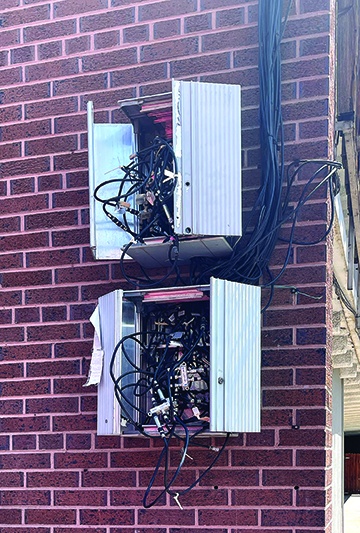
Loose Connections: Audits of 20 affordable housing projects funded by the Department of Housing Stability found shoddy upkeep, including exposed-damaged electrical wires.
e rented at rates for people in the target income, the lower-than-average prices are not guaranteed if market conditions change — resulting in potential rent increases and loss of affordability.
District Deals
Additionally, some City Council districts are receiving more affordable housing resources than allowed. Specifically, districts 1, 3, 8, and 9 all received more affordable housing funds than allowed.
Further, district 3 was restricted to receiving fewer funds than other districts because of existing affordable housing investments. While the agreement allows the department to grant a waiver to any one district, except district 3, discussions about waivers are ongoing.
The housing authority is also counting units developed with “different city funding sources” as part of the D3 project, further inflating the results.
Clinch & Confirm
Finally, the audit found several other areas in which the city can make improvements to maintain and improve the city’s affordable housing struggle.
First, the city is not ensuring contractors are complying with wage laws on affordable housing projects. These projects may be subject to federal wage requirements or the city’s prevailing wage ordinance.
The Department of Housing Stability also needs to verify income annually for residents. The department also needs adequate
controls over its data, including what is used to populate public dashboards.
Agree To Improve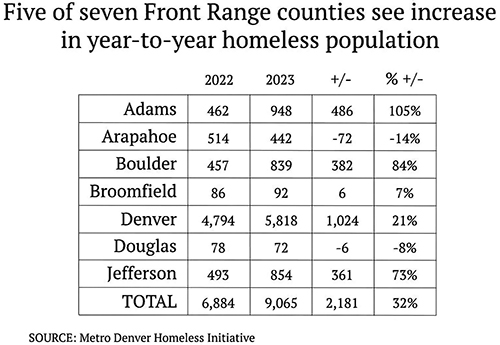
The Department of Housing Stability has agreed to implement nearly 90% (17 of the 19) of the audit recommendations.
It is disappointing, however, that the department chose to disagree with two of the audit recommendations. Those proposals would significantly improve the city’s inspection and maintenance of homeless units. Furthermore, it would ensure affordable housing is sanitary and safe.
The audit found issues at 14 of 21 homeless properties, despite inspection forms from the city showing no issues at the same properties.
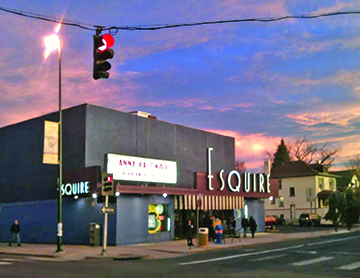
by Valley Gadfly | Dec 15, 2023 | Main Articles
Dodging Wrecking Ball, Building Will Be Enlarged And Reshaped; Will The Remodel Preserve A Picture Of Denver’s Movie Theatre Past?
by Glen Richardson
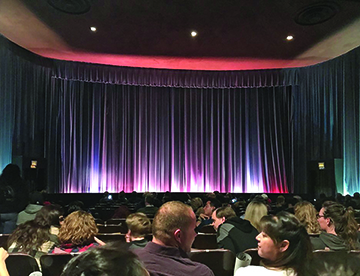
The Last Picture Show: As times changed, along with tastes in entertainment, theatre building will be turned into restaurant, retail, and office space.
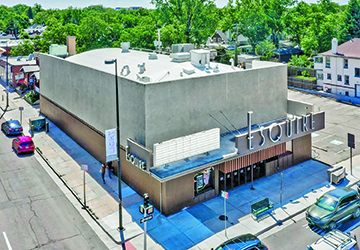
Swapping Size, Shape: The Esquire Theatre building will be enlarged and reconfigured. Landmark Preservation Commission must approve building’s reconstruction.
Are you ready to feel a little down, despondent, and dejected? Flicks are being flicked off at Cap Hill’s historic Esquire Theatre. Lessee Landmark Theatres reopened the site last June following water damage declaring, “We’re back… and better than ever!” The lease expires in July of this year (2024), evidently without a renewal option.
The building was purchased by Sam Leger and Tim Finholm of South Broadway-based Unique Properties for $2.1 million in 2021. At the time of purchase, Finholm implied that “what happens with the property will depend on whether Landmark wants to stay.” It’s unclear, however, if shuttering the theatre was Landmark’s choice or a joint decision. Regardless, Unique Properties CEO Leger and Executive VP Finholm are listed on the building’s application for conversion.
Nestled on the corner of 6th Ave. and Downing St., the cinema has long been a neighborhood and Capitol Hill staple. Since opening in the fall of 1927 as the single-screen Hiawatha Theatre, the Esquire expanded and withstood the test of time. It has been leased to Landmark since 1980. Landmark also operates Denver’s Mayan, Chez Artiste, and Landmark Greenwood Village theatres. Once controlled by billionaire Mark Cuban, the theater chain sold to Cohen Media Group in 2018.
Shock, Sadness
The tucked-away Downing St location made the Esquire uniquely popular and a Mile High City cultural icon. In a city that once boasted as many as 66 movie theaters, it has long been known as one of Denver’s historic movie palaces.
Within hours followin

Sign Signals Switch: Plans suggest the Esquire Theatre marquee sign will remain on the remodeled structure as homage to the theatre and building’s history.
g the closure announcement Cap Hill residents and Esquire admirers took to social media to express their shock, sadness, and dismay: “I will be so heartbroken if we lose this. The Esquire is such an important part of Denver, of the film culture here.” Further, added another: “I know change is inevitable, but I wonder what will fill the void of these type of micro-communities that existed in the real, non-internet, world.”
Others summed up loss of the irreplaceable experience thusly: “It’s so sad watching so much of Denver die one piece at a time. Let’s just murder everything about Denver that was cool and make us a cookie cutter, mixed-use city.”
Building To Stay
The two-story building that housed the Esquire, however, will endure. The site will be enlarged and reshaped into a mix of restaurant, retail, and office space. Denver’s Landmark Preservation Commission must approve reconstruction of the building. If it is approved, the project is expected to start this June and be completed by January 2025.
The public became aware of the theatre closing at the end of last October when Denver’s Department of Community Planning & Development received redevelopment plans for the theater property.
Those plans, submitted by Michael Noda — a partner at architectural firm Neo Studio located on Walnut St. in Denver — call for increasing the two-story, 9,175-sq.-ft. theater building by more than a 6,000-sq.-ft. An addition on the south end of the building would stretch the structure into the parking lot.
Change, Sign Stays
If approved, the building is expected to total 15,800-sq.-ft. on the property’s 0.39-acre lot. Documents indicate the first floor will be divided into two 3,675-sq.-ft. units, one for retail, the other a restaurant space. The upstairs would be turned into office suites.
Plans for the building’s renewal include the addition of several small structure components. Site plans indicate new entrances will be constructed on the no
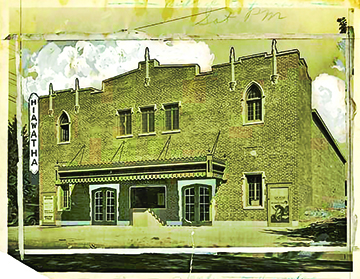
Historic Hiawatha: Photograph of the Esquire building at the 1927 grand opening as the Hiawatha Theatre. Winners of the Wilderness was showing on the single-screen.
rth and south sides of the building. More: Skylights will be installed on the roof, plus awnings added on the north side of the building.
One thing, however, will apparently remain the same. Plans indicate the current Esquire signage will remain as homage to the theatre and building’s history.
Poignant Predictions
Can the Esquire building recover from a remodel? Repurposing of existing buildings is a newsworthy issue, particularly with Denver’s rich architectural heritage.
“Architecture is not really about buildings, any more than poetry is about vowels,” is how award-winning architect Sam Rodell explains the emotions associated with buildings.
Denver’s Esquire enthusiasts relate to Rodell’s emotional building claim, and share their thoughts about the proposed remake of the movie palace building: “It
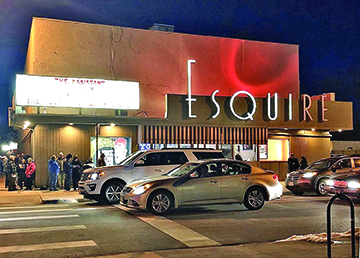
Going, Going, Gone: Movies at the Esquire Theatre have been good to the end, but functional and technical obsolescence will turn the building dark this year.
would have been good to end up with a theater use and the parking lot redeveloped with a new restaurant and housing. But two-screen theaters are clearly not profitable, especially with the Mayan so close showing the same kind of program. Admits another, “Having an active street front rather than a blank wall on 6th Ave. will help the area feel more like a neighborhood.”
Conversion Countdown
The Esquire building is a connection between the past and present, and a way to preserve local memory and culture. It was a space where we created memories of time spent with family and friends in the dark watching films that are no longer with us. The structure was a witness to another age and hopefully will become a living example of Denver’s movie theatre past.
So as not to lose the memory of what came before, Neo Studio — the architectural firm remodeling the Esquire building — is being called upon to adapt the existing building to meet new needs. It will require a great deal of creative effort, and local feedback since the project involves changing the entire function of the building.
As with any renovation, uncertainty, surprises, and last-minute changes are possible if not probable. Capitol Hill and Denver residents, plus Esquire fans and movie buffs are holding their breath, waiting anxiously and excitedly to see what materializes.
Esquire Draws Signatures; Owners Reapply For Remodel
An online petition had collected more than 2,500 signatures to save the Esquire Theatre by early December @savethe esquire. Seeking to stop site redevelopment, the group hopes the theatre will be designated a historic landmark.
Denver’s Community Planning & Development disclosed in December that they were awaiting resubmittal of the plans due “to issues” with the original proposal. When questioned about plans to stretch construction into the parking lot, owners retorted: “We don’t have plans to do anything to anything at the moment. We just made a submittal.”
Should the theatre get a landmark designation, the Landmark Preservation staff opinion is that, “the theatre could still be developed for uses other than a theater.”

by Valley Gadfly | Dec 15, 2023 | Valley Gadfly
Valley Gadfly
“Ding Dong, Ding,” is how Ex-Beatle George Harrison wrote a joyous guitar riff urging listeners to “ring out the old, ring in the new.” Perry Como released the song “Hot Diggity.”
Will the year 2024 be a new chapter, new verse, or just the same old story? “Ultimately, we write it. The choice is ours,” submits British author, poet, and lyricist Alex Morritt.
Here are our fresh start January choices for shopping, dining, and entertainment as you step into the New Year with new intentions, new goals, new snow, and new beginnings:
For an engaging, special start to the year see the play “Ones Who Return,” based on Ghosts by 19th Century playwright Henrik Ibsen. Dates are Jan. 5-6 and 12-13 at the Firehouse Theater on the Lowry Campus. Information: 303-562-3232.
Swifty Alert: Join the Denver “fanaticism fandom” speeding to the Bluebird Theater for the traveling Taylor Fest, Jan. 6, 6 p.m. Information: 303-377-1666.
Strap on spurs and “steer” your way to the annual National Western Stock Show to see rodeos, cattle, plus a trade show, Jan. 6-21. Information: 303-297-1166.
Catch rare concert by renowned reedman (sax-flute) Joe Anderies and pianist Chuck Lamb at Jazz Denver Jan. 13, 6:30 p.m. Information: 303-839-5100.
Enjoy the “Art of Living Well” at St. Andrew’s Village. Wellness retirement community has programs, classes, outings to pique your interest. Independent, assisted, rehabilitation & skilled nursing on site. Information: 303-214-2646.
Add Wash Park’s Restaurant Olivia to your 2024 dining list. Renovation of tasty Italian eatery at 290 S. Downing St. has doubled seating to more than 120. Entry is on Downing with 1,200-sq.-ft. expansion. Information: 303-999-0395.
Pacifica Quartet and soprano Karen Slack perform songs from Walker’s Lyric for Strings at the Newman Center, Jan. 17, 7:30 p.m. Information: 303-871-7720.
Rock and Roll into the new year with light, smoke, fire, and pyrotechnics as Hairball comes to the Paramount, Jan. 20, 8 p.m. Information: 303-623-0106.
Symphony contrasts Mozart’s music with today’s composers at Mozart & Now at Boettcher Hall Jan. 26-28, 7:30 p.m., Sun. 1 p.m. Information: 303-623-7876.
Enjoy Winter Brew Fest’s drinks, food trucks, and karaoke at Mile High Station to benefit Big Bones Canine Rescue Jan. 27, 1-10 p.m. Information: 720-946-7721.
Trees are our shelters and sanctuaries. Thus, as we transition into 2024, help The Park People stand tall in the New Year. In 2023 the non-profit provided 1,500 trees to residents through Denver Digs Trees, up 16% from the previous year. Most were planted in low-canopy, heat-risk areas. Moreover, they added 290 trees in local parks and affordable housing areas. We learn character from trees, values from roots, and change from leaves. Information: 303-722-6262.
January is the month that wipes our slate clean. January is kind of like Monday; nobody really looks forward to it, and it comes immediately after a blissful time off weekend.
Oh, hot diggity, dog ziggety, boom: It’s a New Year and dreams come true thattaway! By shedding the snow, plus our past, a fresh start will replenish our souls to start a new chapter.
— Glen Richardson
The Valley Gadfly can be reached at newspaper@glendalecherrycreek.com.

by Valley Gadfly | Nov 16, 2023 | Main Articles
Bike Lanes Pedal Past Cracked, Crumbling Sidewalks As City Council Delays Repair Due To A ‘Built-In Bias’
by Glen Richardson
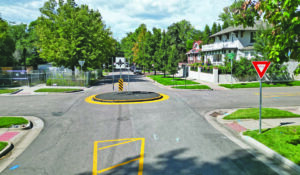
Small Roundabouts Big Problem: New “bikeway” roundabouts are causing accidents and slowing the response time for emergency vehicles. Denver Fire has paused its approval.
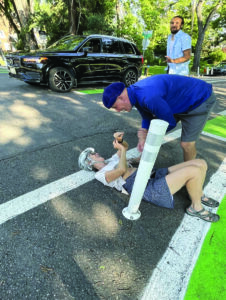
Reworked Doesn’t Work: Reconfigured bike lanes cut across and to the side of the 7th Ave. & Williams intersection. A blind spot caused resident Jan Douglas to take a spill. Photo: Channel 7, KMGH-TV

Disorderly Design: Bike lane intersection designs by Denver’s DOTI are creating chaos for motorists, pedestrians, and bicyclists. This helter-skelter design is at 7th Ave. and Williams St.
If sidewalks are for pedestrians, why did Denver’s bicycle lobby campaign for a sidewalk tax?
Biking advocates — using the name Denver Streets Partnership — launched the 307 Campaign in Aug. 2022 promoting “Denver Deserves Sidewalks.” The campaign claimed it would remove the responsibility for repairs from adjacent property owners and place the responsibility on the City of Denver. Through a “modest annual fee” citywide construction and repair of sidewalks would be underway and finished in nine years.
Passing with 55.85% of the vote last November, residents using wheelchairs, crutches, canes, plus those with visual or cognitive impairment, would soon be using sidewalks. So would children and older pedestrians with reduced motor skills.
Fee Collection Delayed
A year later there are still no sidewalk repairs, nor will there be any until at least until July of next year. The Denver City Council has voted to delay property owner collection fees until July 1, 2024. That’s more than 18 months after voter approval and six months after it was initially scheduled to begin.
City Council decided on the delay due to rising concerns expressed by prope

Chic Lanes Vs. Cracked Sidewalks: These hypothetical, idealized bike lanes are planned to be imposed throughout the city. Pedestrians and wheelchair users continue to watch their step as the gulf between the two uses widens.
rty owners. Increasingly, property owners told council members the Streets Partnership built bias and discrimination into the plan.
“I am part of the unfortunate 15% of people who will be paying over $400 a year in sidewalk fees simply because I am unlucky enough to live on a corner lot,” says Erin Feldman. Like so many others, Feldman urged City Council not to roll the plan out without further consideration and planning. “They’re gross inequities in the plan and it is an unfair burden for people like me,” she tells the Chronicle.
Hit On Homeowners?
Before the Denver Deserves Sidewalks initiative passed in 2022, property owners were responsible for maintaining their own sidewalks as needed. The new Street Partnership funding structure instead collects money from homeowners based on linear footage of the property, wealth of the neighborhood, and if the home is on a corner lot.
Homeowners being responsible for their own sidewalks is akin to how other big cities take care of sidewalks. In Chicago, property owners and the city share the cost of replacing sidewalks. The cost per square foot to property owners is well below what a private contractor would charge. Through their Sidewalks Repair Program, New York City performs free repairs for qualifying broken sidewalks.
Advocates still claim the change is a safety and accessibility win in a city with so many broken and nonexistent sidewalks. But questions remain about how long the rollout will take, how much the program will actually cost, and what will done about properties with extremely high fees.
Sudden Switcheroo
Duped, misled, hoodwinked?
Throughout the campaign the Denver Streets Partnership promoted itself as a local street safety advocacy group. Today, however, the Street Partnership and Jill
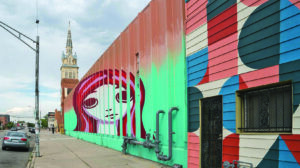
Sad Sidewalk Symbol: Larimer Girl mural by local artist Jeremy Burns seems to suggest sadness and disappointment in Denver’s sidewalks.
Locantore, the executive director, are staff members of the nonprofit advocacy organization Bicycle Colorado. WalkDenver has also merged with Bicycle Colorado. Staff members of the former groups still claim to support sidewalk improvements.
As the state’s political advocacy group for bikers, Bicycle Colorado helped pass Denver ballot measure 2A, creating the state’s first eBike subsidy. The city’s E-Bike rebates are designed to build an army of bike lane advocates. They also helped to get $12 million for the eBike subsidy program inserted into the Clean Air Grant program; and added over $1 billion in funding to the statewide transportation bill. Moreover, Bicycle Colorado has funded and promoted the increasingly controversial 196 miles of on-street bike lanes in Denver.
Biker Bunny Hop
The Denver 307 Campaign’s promise to repair deteriorating sidewalks still awaits the overhaul to begin. So does the construction of new sidewalks where needed, or upgrading walks to ADA standards.
Nonetheless, the bike lobby continues to bunny hop over the city’s cracked sidewalks, adding 24 miles of painted bike lanes, 45 miles of buffered bike lanes, 23 miles of protected bike lanes, and 34 miles of neighborhood bikeways. Cost to the city so far is $13.4 million.
In addition, critics claim Denver’s Department of Transportation & Infrastructure (DOTI) is primarily giving bikers multiple ways to get around town, rather than a system for all people.
Bike Lane Impact
Denver expanded the ways the streets are used without being able to expand the streets. Their width is unchanged, but on many blocks, traffic lanes were narrowed to create space for a bike lane. On streets with protected bike lanes, a narrow buffer has also been squeezed in, making the traffic lanes even thinner.
Detractors say that due to being poorly planned, narrower streets in Denver are filled with cars and “mostly empty” bike lanes.
Denver and other cities were never intended to accommodate bike lanes, they argue. They also claim bike lanes make the worst common cycling accidents more common. Adding them also reduces parking spaces for cars and increases traffic jams. The debate also reflects tension over the future of cities, and anxiety over a new pattern of urban planning that no longer prioritizes the automobile.
Bike Owners Vs. Lobby
Albeit a powerful city-state political money moocher, Bicycle Colorado represents a small segment of Denver’s biking community. Most of the approximately 560,000 metro bicycle owners don’t participate in or fathom what the organization does.
Denver has had 889 bicycle thefts reported so far this year. Despite averaging 96.2 robberies per month, the lobby does little more than proclaim they “provide a voice for people who ride bicycles.”
Bike to Work Day — the free Denver Regional Council of Governments backed event — had 17,981 riders in 2023. A Winter Bike to Work Day in 2024 is set for Friday, Feb. 9, followed by the Wednesday, June 16, Bike to Work Day.




















